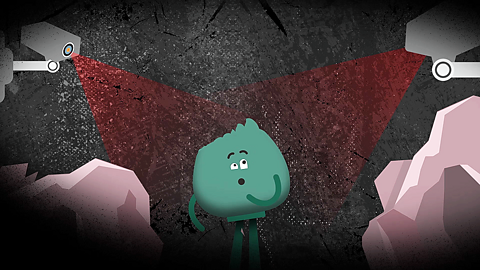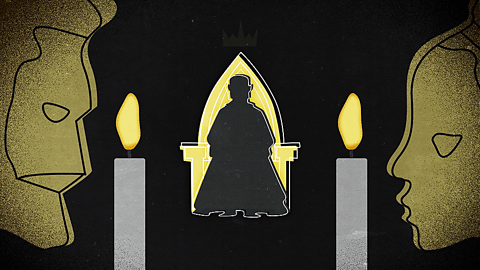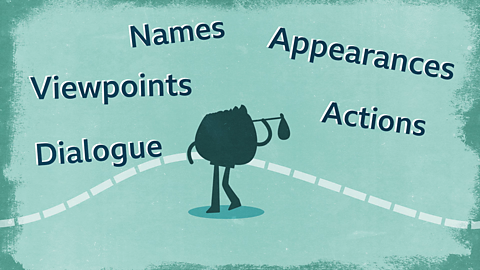What percentage of vocabulary does a reader need to understand in order to understand the whole text?
a. 65%
b. 86%
c. 98%
Answer: c
A reader needs to understand 98% of the vocabulary to understand the whole text.
Introduction to unfamiliar vocabulary
- Vocabulary means the words that make up a language.
- When reading, you are likely to come across words that you don't understand.
- Strategies can be used to work out the meaning of unfamiliar words, such as using the surrounding words to provide clues or breaking a word down.
A video about strategies to understand unfamiliar vocabulary
Learn strategies to help you understand unfamiliar vocabulary
Learning new vocabulary
There are lots of reasons why you might come across words that you don't know the meaning of. Language has changed over time, so older texts might contain unfamiliar words that are no longer commonly used. Or a text on a specific topic might contain technical terms that are only used in that area. Or it might just be one you haven't come across before. Discovering new words is part of the fun of reading and it gives you more words to use in your own writing.
Itās important to understand unfamiliar words so that you can interpret the overall meaning of a sentence. Misunderstanding a tricky word can prevent you from understanding a textās meaning. If you have a dictionary then you can look up the meaning of a tricky word.
Find out more about how to use a dictionary.
Sometimes though you may not have a dictionary to hand so it's useful to have other ways to work out the meaning of an unfamiliar word.
How important is understanding vocabulary?

Have a go at reading this passage with some of the vocabulary missing.
Can you can work out what the passage is about?
Firstly, you should ______________ the ______________ . Whilst the ______________ is ______________ you should get the ______________ ready by putting the ______________ in the ______________ . Once the ______________ is ______________ you should pour the ______________ ______________ into the ______________ . Leave the ______________ to ______________ for four to five minutes, add ______________ and enjoy!
Firstly, you should boil the kettle. Whilst the kettle is boiling you should get the cup ready by putting the teabag in the cup. Once the kettle is boiled you should pour the boiling water into the cup. Leave the tea to brew for four to five minutes, add milk and enjoy!
How accurate was your guess? You may have been able to work out that the passage was a series of simple instructions, placed together in a sequence. In this case how to make the perfect cup of tea!
How many words are familiar?
Looking at the rest of the sentence
It can help to look at the parts of a sentence before and after an unfamiliar word. Identifying whether a word is used as a nounA naming word for an object, idea, person or place., verbA verb is a word that shows an action (physical or mental) or state of being. or an adjectiveA word which describes a noun or pronoun. can give a clue to its meaning.
The rest of the sentence will also give other clues. For example, in Sir Arthur Conan Doyleās The Hound of the Baskervilles:
Somewhere there, on that desolate plain, was lurking this fiendish man, hiding in a burrow like a wild beast, his heart full of malignancy against the whole race which had cast him out.
There are several words in the example that may be unfamiliar. Take āmalignancyā, for instance. The words around it suggest that it means something negative. They imply that the heart of the man is āfullā of something āagainstā people who have been cruel to him.
As well as looking at surrounding words, you may also get some clues by thinking of similar words that might be more familiar, like āmaliciousā, which means intending to do harm to others. This gets close to the meaning of the word āmalignancyā in this context, which means āwishing to do evil to othersā.
Break down the word
Etymology is the study of word origins and how the meaning of words has changed. Taking an interest in the history of words can help you understand unfamiliar words.
In The Hound of the Baskervilles, Conan Doyle uses the word āimmaterialā which may be unfamiliar to some readers:
I knew that seclusion and solitude were very necessary for my friend in those hours of intense mental concentration during which he weighed every particle of evidence, constructed alternative theories, balanced one against the other, and made up his mind as to which points were essential and which immaterial.
If you know that that āimā is a prefix which often means 'notā you can break down the word to help you work out the overall meaning:
- immature means not mature
- impossible means not possible
- impolite means not polite
- impatient means not patient
This knowledge may help the reader work out the meaning of the word āimmaterialā. The etymology of the word would suggest that the meaning of āimmaterialā is ānot materialā. The surrounding words suggest that the word āimmaterialā contrasts with āessentialā. This can be used to work out that this word means ānot importantā.
Using root words
The root word is usually the main part of a word from which other words āgrowā. A knowledge of root words can really help you work out the meaning of some unfamiliar words. For example:
- mono means one
- auto means self
- bio means life
- graph means write
- chrome means colour
Just using this list, could help you work out the meaning of āmonochromaticā which means āone colourā and āautobiographyā which means āwriting about your own lifeā.
Being curious about unfamiliar words will expand your own vocabulary and help you improve your writing and reading skills.
Test your knowledge
Play Bitesize secondary games. gamePlay Bitesize secondary games
Have fun playing science, maths, history, geography and language games.

More on Critical reading
Find out more by working through a topic
- count1 of 11

- count2 of 11

- count3 of 11

- count4 of 11
